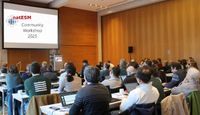24.
Feb 2025
natESM Community Workshop 2025
The fifth natESM community workshop took place in Berlin on February 18 and 19, 2025. Over the course of two days, scientists and developers discussed the continued development of the natESM system and ways to strengthen collaboration within the community.
17.
Feb 2025
3rd ICG-EMO Workshop: Marine Ecosystem Modeling of the North Sea
From February 11 to 13, 2025, the third ICG-EMO workshop of the OSPAR Commission took place at the DKRZ in Hamburg.


